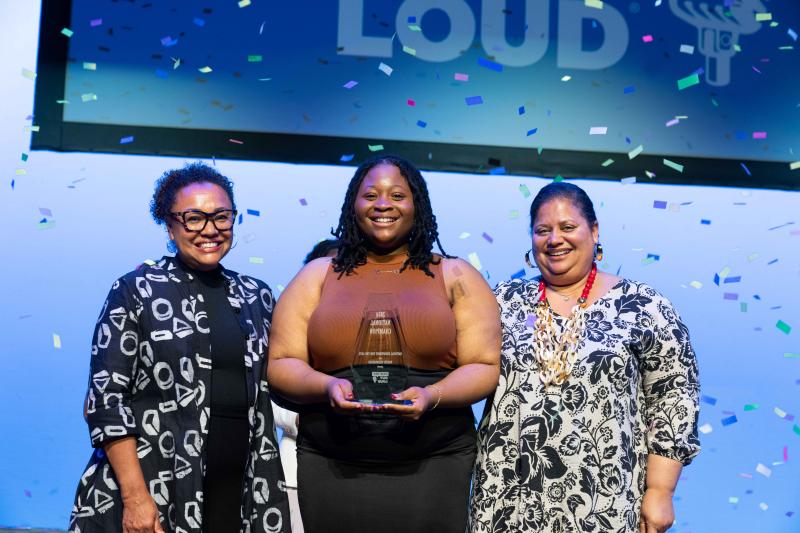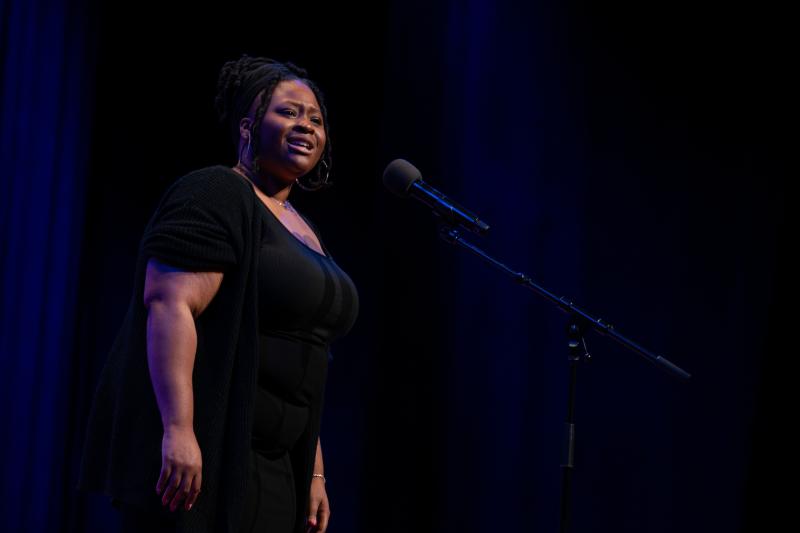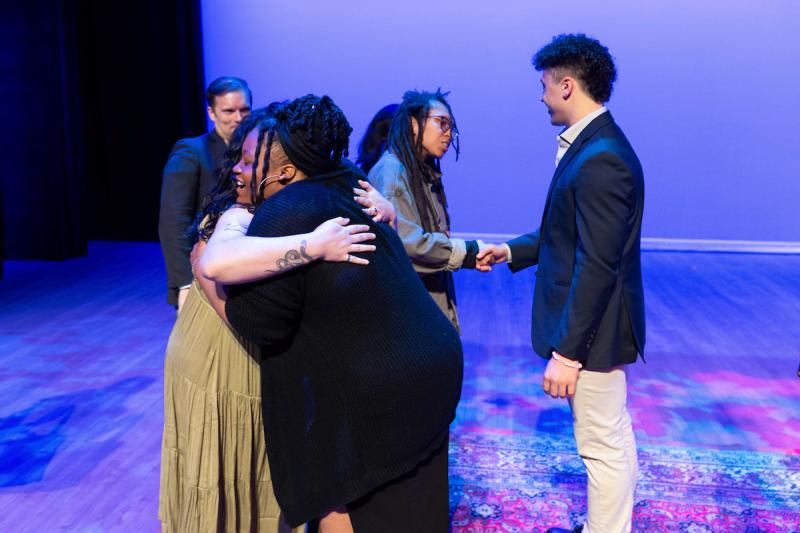Embracing Your Voice: A Conversation with 2024 Poetry Out Loud National Champion Niveah Glover

2024 Poetry Out Loud National Champion Niveah Glover with National Endowment for the Arts Chair Maria Rosario Jackson (left) and Poetry Foundation President Michelle T. Boone (right). Photo by James Kegley
Under a flutter of confetti with the opening beat of The Black Eyed Peas’ “I Gotta Feeling” swelling around her, Niveah Glover was named our 2024 Poetry Out Loud National Champion on May 2nd, the first from Florida to win the Finals competition in the program’s 19-year history.
After reciting poems by Patricia Smith, Paul Laurence Dunbar, and Ashanti Anderson, she walked away with not only the title but a $20,000 grand prize. And it wasn’t just a good night for Glover—it was a great week, as shortly after her big win, the graduating senior at Douglas Anderson School of the Arts in Jacksonville, Florida, was named a U.S. Presidential Scholar in Arts. This program recognizes students who demonstrate exceptional talent in the visual, creative and performing arts, and it is one of the nation’s highest honors for high school students.
Glover’s hard work and many accomplishments, which also include serving as Jacksonville’s Youth Poet Laureate, have earned her a spot in Howard University’s incoming freshman class, and we are thrilled to see what comes next for this talented student.
A few days after winning the 2024 Poetry Out Loud National Finals, we sat down with Glover via video conference to talk about her reaction to the big night, writing her own poetry (did we mention she was also runner-up in this year’s Poetry Ourselves written competition?), and what advice she has for future Poetry Out Loud participants.
National Endowment for the Arts: What did it feel like in the moment you found out that you were the Poetry Out Loud National Champion?
Niveah Glover: It felt so surreal. It still feels like that. I don't even know how that happened.
NEA: How was the Finals experience overall, coming in and meeting all your fellow state champions?
Glover: Life-changing, really. It was so great to see so many people so happy about being there, just being there—not even about the prize money, but just to be in the same vicinity as each other. [There were] people telling you their poem selections and being happy to explore literature with you, and I think the moment I got there, I was like, “This is definitely a different experience than I had at state.” At state you just come one day and you do it and then you go home. This was very much a longer process that felt way more community based, and I appreciated that.
NEA: You’re so connected to your community back in Jacksonville. What was the reaction when you got home and went back to school after winning?
Glover: That is probably the most heartwarming part of this entire experience. So many people back home were watching it live and they were recording themselves, sending me their reactions. I was backstage trying to get into the groove, and I was getting live updates. People were saying they were watching along and they were rooting for me and my entire poetry community here [in Jacksonville] was watching and supportive.
When our final performances were uploaded and we shared it, that was even more love. There were over 2,000 people who watched my [Instagram] reel of the performance and just sending so many well wishes and congratulations. I'm still getting that to this day.
NEA: That's amazing. And this was not your first time at the Finals. You were an honorable mention back in 2022. How do you feel like you've grown in these two years since that moment, both in terms of the competition and also what the program has done for you?
Glover: Back then I was very much still scared of my own voice, so it was hard for me to continue to do my own work because even in my own writing I was starting to reach out to heavier topics, topics that were more personal.
In [my] sophomore year, it was really me transitioning into a whole new version of myself and of poetry, and at the time, POL definitely helped me usher myself into the new person I was becoming, just exploring some other poets’ work, finding out what I truly wanted to do with my life and with my art. Because I had the privilege of having that experience, even though it was online, I was able to etch myself in stone, say, “Hey, this is what I want to do. This is what I love to do.” It kind of gave me another avenue to look at this art form, not just coming from somebody who's doing it themselves and practicing their own work, but now spending time, spending a large amount of time, with someone else's work.
Seeing myself up there for the finals and comparing that to semifinals [in 2022], I can drastically see the difference when it comes to confidence and piece selection, all of those things.

2024 Poetry Out Loud National Champion Niveah Glover of Florida. Photo by James Kegley
NEA: As you mentioned, you’re a poet yourself. Can you tell me about when you started writing poetry?
Glover: I began writing for performance pieces. I began slamming at 12 years old. I was the youngest slam participant I think Jacksonville has probably ever seen.
When I started slamming, I was writing work that I had seen other people writing in the community—work about politics, works about Black female womanhood, other themes that I had seen my mentors touch on. From there I took that love of slam and I said, “Okay. Well, what can I do with this in a larger space? How can I hone in?” My city has two predominant art schools, a middle school and a high school, and I auditioned for the middle school and got in for creative writing, and then it was just honing the skill from there. It’s a long journey. I've been writing and performing for seven years. I’m still diagnosed with anxiety, still very introverted, so I still have things that I'm definitely still working on, but poetry gives me an outlet to express myself.
NEA: You also won the runner-up spot for Poetry Ourselves for written poem. I loved your poem. It was incredible.
Glover: Oh, thank you.
NEA: Can you talk about writing that one and what the experience was like when you heard that you had received runner-up?
Glover: Yes. That was also crazy. I was not expecting that at all.
I'm a creative writer. I'm a poet and a playwright. That is what I plan to do with the rest of my life, and I had to do a portfolio where I had to talk about something that was really deep and personal to me, something that I've experienced.
I often advocate for young Black girls and young Black women, because the over-sexualization of us is something that is not often talked about. I've personally experienced over-sexualization, and so to write the poem, “These Thighs,” it was a really, really hard but a necessary step in learning how to create the type of poems and poetry that is personal. Creating that was the first step in creating work that allowed me to be less of a we and our, because I write a lot of “we/our” community poems, but that was the first time I wrote an “I” poem.
NEA: Thank you for sharing that. In your video interview after the semifinals you talked about one of the poems you recited, “Self-Portrait as Kendrick Lamar, Laughing to the Bank” by Ashanti Anderson, and what that meant to you. I know you're also a big fan of Patricia Smith.
Glover: Yes.
NEA: What about her work resonates with you, and why did you choose “Hip Hop Ghazal” to recite for the Finals this year?
Glover: I am a huge Patricia Smith fan. If I had to pick three writers that I think have changed the trajectory of my life, it's Patricia Smith, Terrance Hayes, and Kiese Laymon. Those are three writers that I stand on to this day.
I did an entire artist breakdown of Patricia Smith. For one of the assignments in my arts high school, you have to delve deep into a poet and their work and their whole journey—how they started, their books. So I began my introduction to Patricia Smith with her persona poems, and I always thought it was so interesting that she could easily put on the voice of other people, and it would feel so natural and so real and so raw. But she never lost sight of who she was as a person or as a poet.
“Hip Hop Ghazal” specifically was one of the poems in one of the collections that I read in my research about Patricia Smith, and it always stuck out to me because it was a poem where I felt like I knew the woman who was speaking. She sounded like my grandmother or my aunt, and I was like, “This is Black women in their joy.”

2024 Poetry Out Loud Champion Niveah Glover and National Finalist Grisham Locke from Louisiana (right) meeting semifinal judges Matt Bassett, Taylor Johnson, and Leslie Sainz, after advancing to the National Finals. Photo by James Kegley
NEA: As somebody who's said they’re shy, which is so hard to imagine based on your performances, what advice do you have for students who feel that way and are intimidated by Poetry Out Loud?
Glover: I think if you sit with the words long enough and the words really mean something to you, they really speak to you, you're going to want to say them out loud. That is the beauty of the Poetry Out Loud [competition], is that it gives you the space you need to sit with these really deep thoughts, these really raw emotions and really intricate, nuanced pieces of literature. It allows you to get it ingrained in you to the point where you feel like you have to say it.
My biggest tip is to love it—really love the piece and to give yourself all the room you need to keep building on it. I always recommend you stick with those poems. You stick with those poems, you build on those poems, and you let those poems become a part of you. That way, when you are reciting it for an audience, it's not like you are just reciting something you don't believe, but you're reciting something that's ingrained in you.
NEA: Great advice. And what’s next for you?
Glover: In the fall, I'll be attending Howard University, where I'll be double majoring in creative writing and political science. I will be launching my very first poetry book, with all the personal I poems that I'm finally letting flow into the world.
What I hope to do with the rest of my life is to become a playwright. Everyone always says they want to be on Broadway. Well, I would love to be on Broadway, but not me, per se, but my work or my words. I'm debuting my first full-length play, Callas. It's a period piece that takes place in 1970 about three sisters who are dealing with their own personal issues while burying their mom, and so it's about the weekend of their mother's funeral and what happens, the chaos that ensues in those three days as they're continuing to come to terms with her death.
I have a lot of fun, exciting things happening. I'm really excited for the rest of the journey.
Check out Glover's recitation of "Self Portrait as Kendrick Lamar Laughing to the Bank" by Ashanti Anderson from the 2024 Poetry Out Loud National Finals! And read her Poetry Ourselves poem "These Thighs" on arts.gov.




